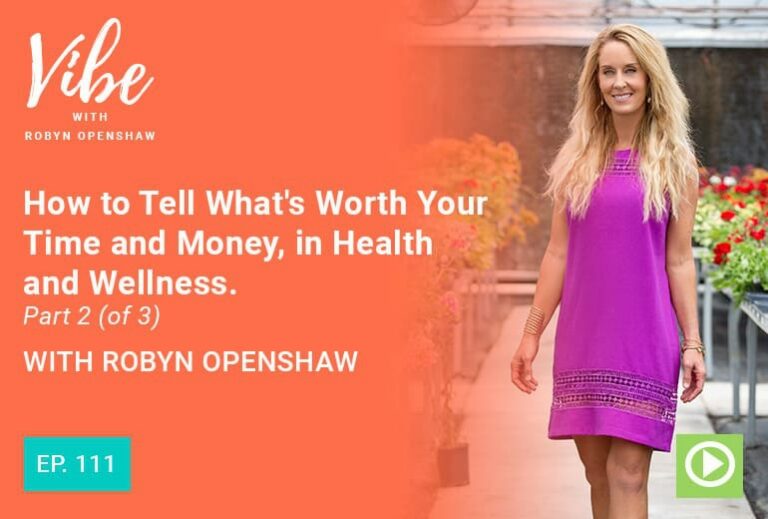Ep. 111: How to Tell What’s Worth Your Time and Money in Health and Wellness, Part 2 (of 3) with Robyn Openshaw

Podcast: Play in new window
Today we get to enjoy Part 2 of this 3 Part Mini-series of episodes where Robyn shares with us from her own years of experience and extensive study in the health and wellness industry. In this episode she dives deep into many of the popular diet and supplement fads and myths that are circling out there. Many that have been around before but may have been re-invented under a different name or changed ever so slightly to appear to be the newest and latest craze to weight loss and wellness. How can you tell fact from fiction? How can you know who and what to believe? What is worth your time and investment? Get ready for some great tips and guidance in sharpening those critical thinking skills of yours to sort through all the confusion and get clear on what is best for you.
LINKS AND RESOURCES:
Check out the Testing Lab ALLETESS
Get the book “Blink” by Malcolm Gladwell
TRANSCRIPT:
Hey everyone and Welcome back to The Vibe Show. In the last episode, I sort of set the stage to talk about some fads in the world of food, nutrition, wellness, sickness, and so I’m going to launch right into it and I’m going to give you examples and I’m going to share with you ways that I like to vet information or ways that I weight different kinds of information in making decisions about my and my family’s health.
Let’s talk about the fad of bio-diversity and also the fad of food sensitivity testing. Now, just because I call something a fad doesn’t mean that there isn’t anything of truth there that there isn’t anything of value there. But what I’m seeing that I consider to be a fad is an argument to ignore the body of research out there about nutrition, for example, in favor of this idea of bio-diversity, which is that we are all different. Now, I don’t disagree that there is diversity in human beings. That’s actually kind of obvious. We are all genetically different. However, we’re also all massively the same. In so many different ways we are the same.
And the body of evidence is comprised of literally thousands and thousands of research studies proving the same things over and over and over and over again, and that is eating lots of animal products are bad for us. Eating lots of whole plant based foods such as Greens, starchy vegetables, other types of vegetables, fruits, legumes, whole grains, nuts and seeds. Good for us. This is clear. However, we have all these fads. Even as late as 2018 when we have over 10,000 published studies all pointing the same direction. And now we have companies popping up who want us to take a test and eat specific foods based on your microbiome.
This whole thing makes no sense to me. As a marketer, it makes sense to me because, Wow! You can make so much money, if you could talk people into thinking that their stool sample tells them what they should and shouldn’t eat very, very specifically and actually those different programs ban lots of healthy foods for a specific individual. Even better. When these companies admit that your microbiome changes constantly, it can change dramatically in hours. It can change almost completely in a matter of days. So of course you’ll need a new test several times a year and we’ll tell you what your diet should look like at that point too. But as a researcher and as a regular human being employing logic, this whole biodiversity thing which is getting super popular and makes no sense on the level of, you know, what the data doesn’t apply to you because you have biodiversity.
Your microbiome can change so quickly in a matter of hours or days that it doesn’t make sense to prescribe a diet based on the real time results in one stool sample. So the science of the microbiome is definitely exciting. It’s definitely emerging. The human microbiome project is only 20 years old. I think we’re going to learn a lot. I think there are going to be a lot of great applications of it. But I think that there is a rush to market right now for solutions or ways to make money based on the science of the microbiome that everyone is super fascinated with. But there’s no evidence that if you have microbe “x” in your gut, you should never eat spinach or strawberries for instance. And that’s the kind of thing that people are doing with this information these days. They’re hurrying to rush a product to market that tells people that healthy foods are bad for them because their stool test said X, Y, Z.
I’m not gonna name names of these tests and these faddish or cultish ways of thinking because I don’t want my colleagues who’ve built their careers out of selling these fads, calling to yell at me. My objective here is really to help you be a little bit more cynical and a lot more smart in what you spend your hard earned dollars on. If you have lots of money and it doesn’t matter if you do some experiments, if you can afford to do that, then great. But I wouldn’t necessarily lock on to this idea that you have to find out the exact right diet for you. For sure, if you have sensitivities to specific foods, you’re going to want to avoid those foods. If you eat a food and it causes problems with your digestion and bloating, I think that it wouldn’t be true to say I am allergic to that food and I should never eat that food again.
So let’s use as another example, the whole idea of food sensitivity testing. There are a lot of lab companies out there who will test and a lot of them are testing completely different things even though they all claim to be food sensitivity. Um, and I have done food sensitivity testing when I’m on a research tore, um, or I’ve been tested by a kinesiologist. And every time the kinesiologist tested me for food sensitivities, all the sensitivities were completely different. Even though there was only a couple of weeks in between my last visit to him. And the lab tests that you get back for food sensitivities vary really widely too. Whether I’ve had a lab done by a well-known lab, or whether it’s kinesiology or whatever. Every single one of about six different food sensitivity tests I’ve ever had are so completely different that there isn’t one single food in common with any of these tests that told me what I’m sensitive to. And so these tests can be up to $2,000 and there are lots of problems with them.
I was talking to my dear friend Alan Christianson, who’s a naturopathic medical doctor. He has been on the vibe show. He was one of the doctors who did a bunch of the video modules in our recent Hormone Health Revolution video masterclass. And I think he is one of the best clinicians in terms of doing his research. He knows what Pub Med has to say, what’s been published out there in the medical journals about a lot of different subjects.
And he told me that he did some blind tests where he took the same patient’s fluids, blood or urine or whatever it was, and sent them, marked as two different people to the same lab. And got back results, showing that same person marked as two different people as having completely different food sensitivities. That makes no sense. Obviously. It was the exact same blood. He also took the same person’s blood, any sent it to two different labs and same thing in almost every case, the same person’s lab work came back from two separate labs, completely different food sensitivities.
So apparently there’s either something sketchy all the way to fraudulent about the way this is done. And my guess is a couple of things. One is our food sensitivities are constantly shifting. A food sensitivity does not qualify as an actual allergy. An allergy tends to be more permanent. Food sensitivities are being healed all the time. And so, so many times we tell people they have a food sensitivity to a healthy food and a week later with no intervention whatsoever, that person might be able to do just fine with that food.
As for food sensitivities testing, my friend Izabella Wentz who wrote a Number One New York Times Bestseller about Hashimoto’s, and she’s a former pharmacist, really likes the lab Alletess. So if you’re going to get food sensitivities, testing, she likes Alletess and Alan Christianson’s favorite labs that passed his blinded testing were US Biotech and Meridian.
One of the problems that I have with this fad of food sensitivities testing is I think that the reason that food sensitivities are constantly shifting is that the microbiome is always changing and when we have a sensitivity to a food, it is more likely to be indicative of leaky gut, gut disease in general and problems in the liver, rather than the fact that we are actually allergic to that food. So we are paying attention to an allergy to the food when what we should really be paying attention to is getting the correction in the microbiome and cleaning up the liver. Doing a really good detox is an outstanding way to eliminate a lot of our food sensitivities.
Let’s talk about a third example. The fish oil industry. I have been openly critical of the fish oil industry and I’ll tell you why. But I’m using this as an example of how more and more the fad is, and this might seem really obvious to you and it might seem like it’s science rather than a fad, but this idea that we should supplement rather than change our diet. I think this partly came from the fact that doctors have an easier time getting a patient to take a pill than they do getting a patient to change their diet and eat the specific foods that contain those nutrients that they’re deficient in.
I got a call in April this past year from a colleague of mine who was mad at me that I call out the fish oil industry. I’ll tell you what I say about fish oil, which she had read and she was upset about. I refer to two major meta studies and later on I’m going to talk to you about the way I value data and how much I value a specific study and what I look for in a study, if I’m going to put a lot of credibility in it or very little or none. A Medical study is highly valuable because it covers, it reviews a lot of published literature on the same subject.
The two meta studies on fish oil show that after 30 years of practitioners telling people to take fish oil for cardiovascular disease, that’s what it was prescribed for, there is no positive effect on any cardiovascular biomarkers. So we do not have less fish oil as a result of the billions of dollars of rancid fish oil that people are taking. It makes no sense to think that if you took a slab of salmon and you put it on your counter and you ate that salmon a year and a half later, would you really expect that salmon to do your body any good? Would you expect those essential fatty acids to be restorative and repairing cells and tissues and your body would use those essential fatty acids? Well, no, of course you wouldn’t because nobody would eat a year and a half old fish. Well, that’s exactly what you’re doing with the fish oil supplement industry.
What do they do to cover for the fact that you’re taking rancid oils? Just as a, you know, it’s just gonna happen when you get the fish out of the ocean and you conk them on the head and then you squeeze the oil out of them and you put them in capsules. And then you put them into the supply chain and wholesaler A moves them to retailer B and it sits on the shelf for three months. And then you bring it home and it sits on your shelf for two months or whatever happens, you know, it’s at least nine months before you ever consume that fish oil generally. And sometimes that fish oil is a lot older than that. So what does the fish oil industry do? They buy deodorizers and purifiers and they add some chemical agents to the rancid fish oil so that you can’t tell when you burp it up that it’s rancid fish oil.
So lots and lots of doctors, including functional medicine doctors tell their patients to take fish oil supplements, which makes sense on the surface level of we know that fish has essential fatty acids and we know that you need essential fatty acids from your diet virtually every day. We might have even done some lab tests to ascertain that you’re deficient in some of your Omega 3’s, for instance. But while that makes sense, on a theoretical level, we know how the result of 30 years of people eating fish oil, to know that it didn’t do us a bit of good.
It did, however, harm some of the world’s biggest waterways. Though I don’t even mean harm it, I mean devastated it. Harmed it to the point where it would take decades of rehab to bring back those ecosystems that have been devastated when billions and billions of fish have been farmed to make a completely useless product.
And so when my colleague called me, she said to me, “I’m not going to support you in any way anymore if you don’t help protect the supplement industry”. Now, I assume that she said that because she’s a part owner in a company that sells supplements and sells supplements through influencers. Um, fish oil supplements are some of the most common, and some of the most lucrative supplements in the supplement industry. And I said, well, okay, yeah, because here’s the thing. I’m not here to defend or promote or protect the supplement industry. I don’t care about their objectives or their profits. There’s plenty of people out there selling rancid fish oil and there’s plenty of people out there protecting the supplement industry.
I’m not interested in protecting whatever it is that the objectives of the supplement companies who sit around a boardroom discussing how much money they made this year and how they can make more money next year. I don’t care about any of that. There are some extraordinary supplements out there. There are supplements that can be very useful. I don’t want that to get lost in this conversation. But 90 percent of supplements out there aren’t really used by the body and or they’re harmful to the environment or in some way just not really useful.
And so the thing is, just as an example, people selling rancid fish oil supplements will definitely quote you studies. The Meta studies covering all the published research on the impact on human health of taking fish oil supplements definitely came up very, very heavily on the side of fish oil has no cardiovascular benefits and in fact may increase the rate of prostate cancer. But there are some studies that you can find if you are looking for studies to support your position. You can find studies that will say something positive about fish oil. And virtually always in the case of a bad fad like people eating year old rancid fish oils or the Ketogenic diet. You know, I’m going to get into that as a fad and explain where that comes from. You can find studies saying something positive about virtually any fad.
And what that usually is, is it’s something short term. So if you go on the Ketogenic diet or if you take rancid fish oil supplements, your triglycerides might fall. Now you’re more likely for your triglycerides to increase from eating all that fat. But depending on what your previous diet is, and that’s something that most of these short term studies are, that the Ketogenic diet marketers will tell you about. Is that they may have taken people who ate nothing but “Doritos” and you know “Dr. Pepper” and put them on the Ketogenic Diet and they’re gonna see a big improvement. Okay. So depending on what your previous diet is, this is one way that you should be thinking when you’re presented with a fad that makes no sense. If you are eating nothing, but you know “Cheetos” and “Ding Dongs”, maybe the Ketogenic diet is actually an improvement for you, even though it’s actually a lousy diet, even though it’s lacking important nutrition in a big way.
Well, so is the Standard American diet. And most people doing one of these diets, eating all kinds of fried and sugary and chemicals added and refined foods, any of these standard American diets. Just because you’ve gone from a really terrible diet to a slightly terrible diet or a less terrible diet does not mean that that diet, I’m talking about Ketogenic Diet here is a good one. So what I care about is the truth and sharing it with you. I consider myself to be an educator and a researcher first, not a marketer. Marketing is the thing that I have to do to be able to be an educator and there’s nothing wrong with marketing. That’s another thing that I don’t want to get lost in all of this.
Marketers aren’t bad people and lots of good products would never come to your awareness if there was no marketing involved. So nothing wrong with marketing. But that’s how I see my life and my professional life, my calling, the reason I’m sitting here talking to you. I mean that is how I show up in the world. I’m former University faculty. I started a Joy School. I co-founded two Charter Schools here in Utah. And I want to make sure if you see me doing any marketing, fact is I don’t identify as a marketer, I identify my life’s mission as being an educator. What I’ve learned as my family was very sick and I had to dig deep and learn and research and make some diet and lifestyle changes. What gets me out of bed in the morning is sharing that knowledge.
If money were my primary objective, I would sell the Ketogenic Diet. See, Green Smoothie Girl wasn’t a job title that someone hired me to be. It’s kind of like a thing that happened because I was the researcher who dug deep and then the neighbors would come to me for my opinion on something because they knew I did my homework and it just kind of went from there. Then the Internet happened. It’s not like I ever had a goal of going on the Internet and having a following of half a million people and then educating and answering questions becomes my full-time job. Sometimes I have to dig on a subject for years before I’m even confident to be able to come out and talk to you about it on a podcast or Facebook live or an email to our subscribers or wherever I might talk about something.
There are still plenty of subjects I don’t know enough about to talk about with confidence. A number of them I’m actively investigating and it’s often a really slow process because a lot of times I’m confused too in the beginning, even for a good while. I’ve got a great sense though of what a quality citation is. If I’m reading an article on the Internet because of my background in research that predates being Green Smoothie Girl. If for instance I see an article on draxe.com or Mercola.com or whatever. If I see it as not primary research, it’s not linking you to actual published research, it’s not something you want to take to the bank. Okay. There are $17 an hour staff writers at most of these biggest sites out there. It’s not like Josh Axe or Joe Mercola actually wrote any of those articles. Remember that an article written by a blogger is not primary research. Okay.
A study published in a Peer Review Journal is. Now not everything that is true is necessarily published in a peer review journal or published anywhere. Unfortunately, usually there has to be some money behind something for a study to be done and usually if there’s money behind this study, there’s also money to be made from the results of that study. So it would be going too far to say that we shouldn’t listen to any published science. That would not be true. It would be good to say we need to have better awareness about the quality of the information, the hierarchy of evidence before we buy into a product or a diet philosophy or even a specific study.
So a little bit later I’m going to talk about what I look for when I see a citation, which is a link to a published study. Even though I have a strong grasp on whether any information I’m exposed to is good or great or totally false or sketchy. Sometimes there’s enough compelling information on both sides of an issue that I just have to keep asking questions before I can arrive at much of a conclusion. Luckily I have access to almost anyone I could want to talk to and I have to keep reading and then after I’ve done more reading then I have more questions to ask of those experts that I am very fortunate to have access to.
But let me give you another example. I think this is our fourth example of a fad. There was a huge fad that made millions and millions of dollars and it’s called the Eat Right for Your Blood Type diet. And I have written at length about what the problem was with this fad diet on the Green Smoothie Girl blog. And I’m not going to go into a lot of detail here or talk about any of the other many other metabolic typing tests. I’m not singling this diet out so much as using it as an example of fads that come along because more of them are going to come along, that much I can tell you for sure. And you can be tricked into believing that there’s validity to the theory when it’s actually pretty much bogus.
The Eat Right for Your Blood Type diet made the author millions of dollars. Wouldn’t it be clever if you just had to eat a lot of animals if you have O type blood? And you eat a vegetarian diet, if you have A type bloods? Well here’s the problem with that. All the cultures of the world have all the blood types, which that all by itself pretty much debunks the entire thesis. There’s also no research to back it up, so there’s something to look out right there. You want to take a look at the references section at the back of the book. If you are savvy, if you read Gundry’s book, “The Plant Paradox”, that tells you that eating legumes, like lentils and beans is going to kill you, you will take a look at the research that he refers to because that will give you a clear picture of how completely theoretical it is and give you a lot better sense of whether it is useful for you to at or not.
So I’ve touched on the Ketogenic diet as an example, but as our fifth example, let’s go a little deeper with that. I know I’ve talked a lot about this subject over the last couple of years and I asked a lot of the guests that I’ve interviewed on this show about this topic. I recently published a blog post called “22 Health Experts Debunk the Ketogenic Diet” and I used quotes from 22 experts. Since then, I’ve had a couple more on the show who wanted to share their thoughts on this trending diet and let’s just say they were not favorable at all. So we could go back and change that blog post to be 24 Health Experts Debunk the Ketogenic diet.
So I don’t mean to beat a dead horse because I know you’ve listened to me talk about how I feel like this is causing harm to the American people this diet. But I bring it up because it’s a fascinating case study on how bad information travels. The Internet gets repeated by thousands of others and it’s actually a totally junk concept that has already been thoroughly debunked back when it was called the Atkins Diet. And it’s a diet that exists nowhere among healthy people. So I bring it up because it’s the perfect example of how smart people fall for really bad fads because it’s tempting to think that if a lot of people are doing it, it must be good.
I know some really great marketers and some really good functional doctors who have big gaps in their knowledge and foundational understanding about human health and the body of evidence in nutrition. To be able to tell people to go hog wild on hamburgers and bacon and avoid all carbohydrates, you pretty much have to be quite ignorant about the past 30 years of research in the field of nutrition. Because it all points some very clear general directions and none of those directions are in favor of a high fat diet. And PS, yeah, I know, there are people out there now due to the backlash of health problems caused by the reinvented Atkins Keto Diet, who are trying to improve the nutrient density of the Ketogenetic diet. To me that is putting lipstick on a pig.
These influencers and marketers want to get in on the billions of dollars that are being made on the Internet, selling people the Ketogenic diet, but they at least have enough integrity or awareness of what’s true in nutrition to help people eat more vegetables and maybe even violate the original premise of Keto and allow in a fruit or a legume now and then, probably not though, and get better sources of fats than bacon and burgers. But you know what? It’s still a fad. It’s still a bad fad. It’s still a bad way to eat even if you’re eating tons of good fats, and I’ll tell you why, or at least I’ll tell you one of the reasons why.
There are many reasons, but let’s talk about fats and your liver. I have read three books on the liver this year, the human liver, how it works, why it’s so miraculous, why we’ve neglected it, not just science and medicine, but each of us have personally neglected the health of our liver. I’m reading one book right now that dives deep into how difficult it is for the liver, which performs 2000 chemical functions for us. You could literally read three books about the liver and still be awed by it and mystified by it and still not be able to quite wrap your brain around how powerful it is. It’s the workhorse in your body, so very complex.
This book I’m reading is about how the liver cannot do its work if you eat too much fat. This book calls for not eating any fat at all until noon every day, and then of course, much better sources of fat than animal fats. So not just the fact that you’re eating bad fat like bacon and burgers or rancid canola oil and butter and deep fried whatever, most of the folks who are doing the Ketogenic diet. But you know what? That’s not the only thing that matters. The other thing that matters even if you’re eating good fats is the ratio of fat as well. Even if your fats are avocado, nuts and seeds, coconut oil, extra virgin olive oil. Even though those are usually quite dismissed on most Ketogenic diets, some of them do eat those better fats.
Even if those are where your fats are coming from mostly, if your quantity and ratio of fats in your food is too high, your liver is crippled and struggling. And you put your liver into a code red situation, if you eat a high fat diet for any length of time, even for one meal. More than 15 percent of your meal coming from fats, your liver is in a code yellow or code orange situation. And if more than 30 percent of fat is in your meal, your liver is in a code red. It’s a heart attack waiting to happen, if that meal was hamburger and sausage and cheese. But it’s still way outside what the liver was built to process, even if some or all of those fats are actually good for you.
Imagine you’re wanting a lot of liver bile flowing, thin and abundant. That is the ideal. If you eat that way, if you eat complex carbohydrates, fruits and vegetables, legumes, nuts and seeds, greens, you’re going to have lots of bile. You’re going to be sopping up the toxins in your bloodstream. You eat the Ketogenic diet way, you’re going to have thick bile and too small of a quantity of it and your bile just isn’t going to be able to do the job of cleaning up for you and getting toxicity out of the body.
It’s no wonder people doing the Ketogenic diet are famous for, and they’re perfectly willing to admit it, for having bad breath and other bad chemical smells coming from them. It’s so sad to me, not just that people promoting this as an appropriate diet, not just them that make me sad, but what makes me really sad is how many people are falling for it. It’s a terrible fad and I wouldn’t keep bringing it up if I didn’t feel really strongly that a massive amount of evidence we already know about. We already know how many heart attacks are caused by people eating a high protein diet, which is always, okay, a high protein diet is always also a high fat diet almost every time. Let me say that again. A high protein diet is almost always also a high fat diet.
But we love the magical thinking of a new way of eating. And this makes us kind of lose our senses and abandon what we already know, is if somebody presents a new way of eating and promises us magical outcomes, somehow defying thousands of studies and somehow saving us from being overweight and feeling crappy all the time. The fact is your liver needs carbohydrates to mop up all those toxins. To put it in the most basic way. Carbohydrates are where fiber is. Nothing the liver hates more than you eating a fiber free or low fiber diet. The only people who can buy into the Ketogenic diet are folks with meat lovers bias.
That’s something that my adopted brother Chris Wark kind of made up I think, he calls it meat lovers bias. But I have not seen anything stronger than meat lovers bias in the world of biases. And I’m talking about wellness experts and even functional medicine practitioners who refused to acknowledged 10,000 published studies in favor of the plant based diet. Okay. Those who just love meat and refuse to look at the evidence against eating it or at least eating it more than just rarely. I don’t see that we, you know, I’m sure we can be healthy eating a little bit of fish.
So just because we’re talking about the liver, how about we put both our hands over our liver right now? It’s right under your right side rib cage. So picture it. It’s sort of big three dimensional, triangular shape. Imagine it filtering your blood while you’re asleep. It never ever stops. It never stops for a single minute of your entire lifetime. It’s doing 2,000 tasks for you. She is the best executive assistant anyone’s ever had. So put your hands over your liver and send her some gratitude with your intention, your vibration. I hope that you haven’t forgotten that gratitude is the highest measured vibration emotion there is.
So when you cultivate gratitude, when you spend time actually thinking and sending out energies to others of being grateful for them, your entire vibrational frequency increases. So thank you dear liver for the thousands of ways that you have served me well every single day. And now you’ve got to know what the liver looks like. Imagine just kind of this big greenish brown triangle shaped giant organ. And imagine yours, she’s the only liver you’re ever gonna have. Will you love her? Will you treat her well? Eating an organic, mostly plant based diet, avoiding processed foods, avoiding eating too many fats, avoid eating animal protein except in small amounts and clean versions. That is how to love your liver.
So continuing on, the fact that the Ketogenic diet was the number one search term on the Internet last year, 2017, and even though the people making money selling Keto, will quote you studies, it still doesn’t mean that this is because it works so well as a weight loss diet or for any other health reason. Effectiveness in weight loss or effectiveness in anything is not why the Ketogenic diet is earning it’s marketers billions of dollars right now.
I’ll tell you a little story from earlier this year. I was asked to go to a one day marketing pow wow with a bunch of health and wellness influencers. The person holding it was a friend and she begged me to come because she said my presence there would enhance the credibility of the event. And so I walked over to this event. It was across the street from the conference that we were all at. And I found myself trapped in this room with a few dozen Keto diet marketers. Lunch was served and they were all pushing their vegetables and other whole foods to the side of the plate because you know carbs are bad. And they just all eight plates full of chicken and beef and they would stand up, most of them were young millennial men, stand up and they would brag about how much money they had made that year selling their Keto course, their cookbooks, their products. You know like those jugs of petrochemical derived ketones, which by the way are proven to do absolutely nothing for your weight loss and they’re toxic. But anyway, I couldn’t get out of there fast enough.
My point is these folks are writing sales pages and they are sending email broadcasts that millions of people have opted in for in the cult like madness raging on the internet about this latest diet because most people just do not have the education and the critical thinking skills and the awareness of the history of the Diet industry to say, “Hey, wait a minute. Didn’t we just see this exact diet from Dr Adkins? What happened to him? It wasn’t good. I don’t think. Right, and didn’t he die of heart disease and didn’t tons of studies come out showing how high the diabetes rate and heart disease rates were for people who followed that Diet for years?”
Not really. For the most part, there’s been little outcry when we bring back an old fad, a bad old fad and dress it up a little. Now, of course, they’ve added peeing on sticks and this idea of intermittent fasting, which is really, just stop eating junk food late at night or any food actually, that’s all it is. And that all by itself will help people feel better. Right? Stop eating junk food or drinking wine or whatever late at night. And Adkins company went bankrupt because why was it wasn’t that guy selling 64 different nutritional supplements? Because people get so nutrient deprived and so toxic and so sick on that high fat, low nutrition diet? Nope. Hardly anybody brings that up or seems to remember that we’ve seen this diet before.
So another tip for you, as I talk through lots of examples and experiences I’ve had, is that if your gut and I’m talking about your intuition, is screaming at you as you are listening to a marketing pitch, listen to your gut. Sometimes you don’t know why you know, but if you want a really cool deep dive on how much you innately know how much below the tip of the iceberg, how much information is below the surface, but available to you at a subconscious level, read Malcolm Gladwell’s book “Blink”. We actually know things in a split second most of the time. Lots of studies on this. What you call your gut instinct might be related to your vegas nerve which goes all the way from the back of your brain to yes, your actual gut. Your brain and your gut are a lot more connected than we ever understood until recently.
So just remember that if somebody’s marketing, sounds too good to be true, if you are uncomfortable with what you are hearing, and somebody is pitching you something based on some painful parts of your life where you are vulnerable, like your health and they’re hitting those raw nerves hard, but you’re uncomfortable with the product or the price, there are probably some very good reasons for that. So listen to your intuition. Gosh, I have learned that one the hard way so many times. So if you’re listening to some marketers saying that you can eat all the burgers and bacon and butter you want and lose weight and feel amazing, but your life experience and even what little exposure you may have had to what I refer to as the body of evidence, in the field of nutrition, in your gut or your intuition or screaming at you, then listen to that and run away from marketing like that.
Remember, there are people out there split testing what color to make their sales page, which words to use that will psychologically manipulate people best. They’re testing to find out what alarmist fear based words will trigger you to buy. Really, I’m not kidding. There are tons and tons of these conferences going on and millions of marketers are trained in these kinds of tactics. Which are not a problem if someone is selling a great product with integrity, but it does make the average consumer much more vulnerable to buying a crappy product. And let’s face it, most products don’t deliver on their promise.
So, what do you have as your defense against it? You have all the things I’m talking to you about in this series. In the next episode I’m going to share with you what kind of references are useful, what kind of research. I hope that when you read a blog post, you’re looking at the references page at the end of that blog post, for instance. I hope you’ll get a sense here which references are less useful, which are totally useless and which are good that you should seek out and that maybe deserve a bit more credibility.
So I’ll see you next time.













